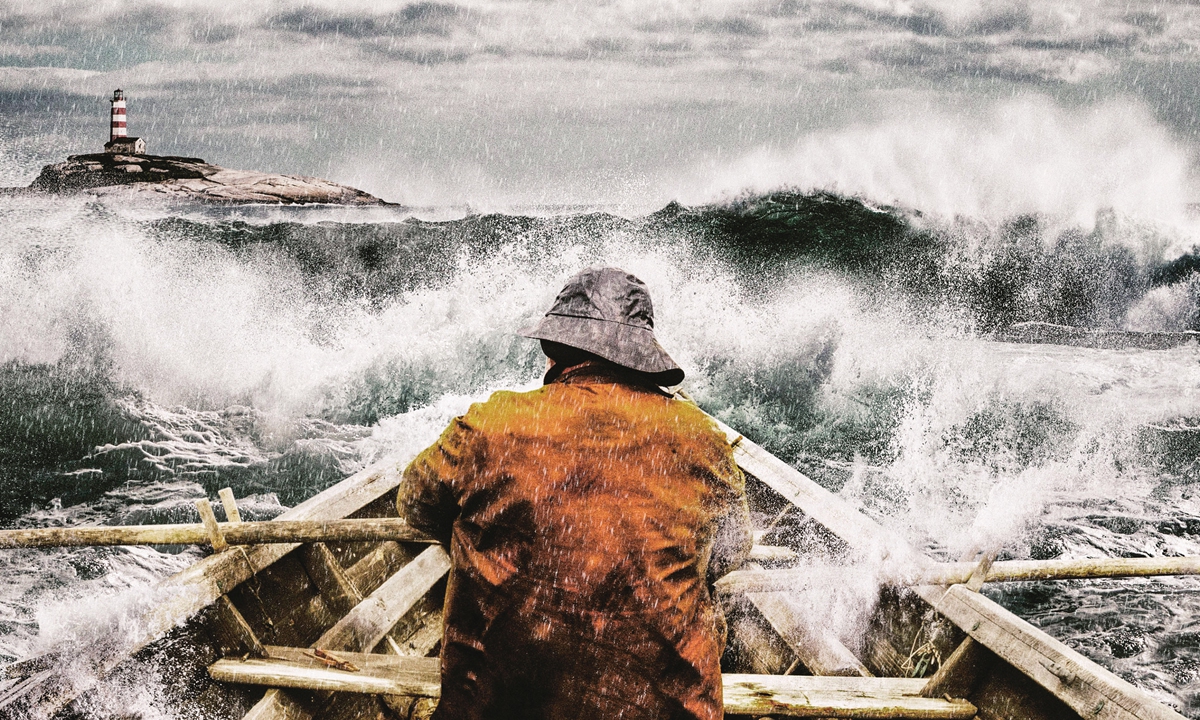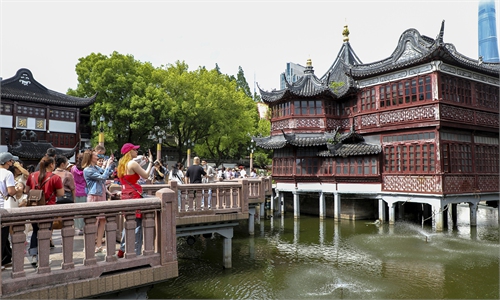ARTS / BOOKS
Reading ‘The Old Man and the Sea’ a journey of gaining tenacity
Igniting hope
Editor's Note:
"Read ten thousand books, and your pen will be guided as if by the gods" is an ancient Chinese idiom that can be seen in students' textbooks. China's Ministry of Education has published an action plan to further promote reading among students across the nation. With new and diverse book recommendations, the reading scene is expected to be revived not only at schools, but also across society. To contribute to this endeavor, the Global Times launched "My Reading Life" essay contest for middle school students.
Please pick up a pen and share your stories with us at reading@globaltimes.com.cn
Participants will be rewarded once the article has been selected.
In this essay, I'm going to tell you my reading story and the spirit I've gained from the book titled The Old Man and the Sea.

In 1952, the novella was published as one of and also the last blockbuster fiction works by Ernest Hemingway. Hemingway was a US author known for his understated writings featuring heart-warming adventure stories.
Picture yourself on an adventure, sailing across a brimless sea with rolling thunder clouds covering the entire sky. You've caught a giant fish called a marlin, which you've been longing for a good while.
To seek a bigger fish, you ought to stay in the sea longer despite your limited food, but now you are engaged in a battle with rough waves, and other cruel sea animals attack the marlin you caught.
The waves eat away your power, the lightning saps your courage.
After 84 days you get to an island, you are out of the woods, but something scary comes. The marlin is eaten up by a shiver of sharks. The only thing left is a pile of bones.
How would you feel when the cruelty of life beats you? Could you tolerate all these setbacks?
For most, maybe not, but the old man Santiago handled it.
He screamed full of passion, "A man can be destroyed, but not defeated. " Though the terrible result tried hard to defeat Santiago, he just had a good sleep and dreamed of his ideal result which was diametrically opposite to reality.
Hemingway used simple words to describe an ordinary elderly man, but allowed people to see his power and bravery between and beyond the lines on the page.
In this book, nature brings too much cruelty in Santiago's way.
The sea symbolizes the power of nature and fate, while the old fisherman, Santiago, represents humanity rising to challenge them.
Through his fight with the marlin, the author demonstrates human courage and wisdom in the face of challenges from nature and fate. Even though he fails to bring back the intact fish, his spiritual victory makes him a true hero.
What makes this book filled with profound revelations is the old man's actions in the face of fate.
Among the whole story, the most classic sentences are "Man is not made for defeat. A man can be destroyed but not defeated."
This is the most famous line from The Old Man and the Sea and the core theme of the novel. It expresses the idea that humans, when faced with difficulties and challenges, may be physically devastated or even ultimately defeated, but their spiritual resilience and perseverance will never be broken. This spiritual strength is what drives humans to continue moving forward.
All human beings need this wisdom to do right thing in the face of dark forces. It's also what The Old Man and the Sea reminds us - don't lose our confidence in ourselves while we are facing challenges from nature and fate, everything is possible if we are willing to create.
It's not hard to read an entire book, just stay calm and feel the story behind the lines, then you'll master the new wisdom of mankind.
Hemingway's world
Hemingway was also a prolific writer. The 1920s and 1950s are seen by many as the "golden time" of his writing career due to the prolific number of novels and short stories published by the author.
Before diving into his books, I researched the author's background and his life experiences. I noticed that he was an adventurous man who once wanted to join the army during World War I, but later ended up volunteering for the Red Cross.
I admire his determination to never want to be excluded outside the turmoil of the times. This was like a window for me to look deeper into the writer's character and his adventurous, humanitarian and brave spirit.
By reading his works, I discovered that his personality was transferred to the characters in his books. They speak for this writer and allow Hemingway himself to convey his qualities to people.
On account of that, I could really feel the human power of literature since stories are not just words and sentences, but are tools delivering the virtues of human beings.
Positive qualities like courage, compassion and tenacity, along with even some other shady ones like "betrayal," "life struggles" and "weakness" can all be perceived in books.
Those concepts are fundamental factors for people to debate topics like how moral standards should be formed and what can be the common beliefs for people despite cultural differences, and why positive mindsets contribute to forming a better society.
Give away many of Hemingway's novels and stories, there was one book titled A Moveable Feast that was published in 1964.
The book was a memoir detailing some of Hemingway's personal life stories featuring his marriage with Hadley Richardson and his connections with figures like James Joyce and Hermann von Wedderkop, a German writer.
James Joyce, with his masterpiece Ulysses, is still praised by many as one of the most important writers of the 20th century.
The author is a student at the Affiliated High School of Beijing Foreign Studies University
"Read ten thousand books, and your pen will be guided as if by the gods" is an ancient Chinese idiom that can be seen in students' textbooks. China's Ministry of Education has published an action plan to further promote reading among students across the nation. With new and diverse book recommendations, the reading scene is expected to be revived not only at schools, but also across society. To contribute to this endeavor, the Global Times launched "My Reading Life" essay contest for middle school students.
Please pick up a pen and share your stories with us at reading@globaltimes.com.cn
Participants will be rewarded once the article has been selected.
In this essay, I'm going to tell you my reading story and the spirit I've gained from the book titled The Old Man and the Sea.

Photo:VCG
Adventure storyIn 1952, the novella was published as one of and also the last blockbuster fiction works by Ernest Hemingway. Hemingway was a US author known for his understated writings featuring heart-warming adventure stories.
Picture yourself on an adventure, sailing across a brimless sea with rolling thunder clouds covering the entire sky. You've caught a giant fish called a marlin, which you've been longing for a good while.
To seek a bigger fish, you ought to stay in the sea longer despite your limited food, but now you are engaged in a battle with rough waves, and other cruel sea animals attack the marlin you caught.
The waves eat away your power, the lightning saps your courage.
After 84 days you get to an island, you are out of the woods, but something scary comes. The marlin is eaten up by a shiver of sharks. The only thing left is a pile of bones.
How would you feel when the cruelty of life beats you? Could you tolerate all these setbacks?
For most, maybe not, but the old man Santiago handled it.
He screamed full of passion, "A man can be destroyed, but not defeated. " Though the terrible result tried hard to defeat Santiago, he just had a good sleep and dreamed of his ideal result which was diametrically opposite to reality.
Hemingway used simple words to describe an ordinary elderly man, but allowed people to see his power and bravery between and beyond the lines on the page.
In this book, nature brings too much cruelty in Santiago's way.
The sea symbolizes the power of nature and fate, while the old fisherman, Santiago, represents humanity rising to challenge them.
Through his fight with the marlin, the author demonstrates human courage and wisdom in the face of challenges from nature and fate. Even though he fails to bring back the intact fish, his spiritual victory makes him a true hero.
What makes this book filled with profound revelations is the old man's actions in the face of fate.
Among the whole story, the most classic sentences are "Man is not made for defeat. A man can be destroyed but not defeated."
This is the most famous line from The Old Man and the Sea and the core theme of the novel. It expresses the idea that humans, when faced with difficulties and challenges, may be physically devastated or even ultimately defeated, but their spiritual resilience and perseverance will never be broken. This spiritual strength is what drives humans to continue moving forward.
All human beings need this wisdom to do right thing in the face of dark forces. It's also what The Old Man and the Sea reminds us - don't lose our confidence in ourselves while we are facing challenges from nature and fate, everything is possible if we are willing to create.
It's not hard to read an entire book, just stay calm and feel the story behind the lines, then you'll master the new wisdom of mankind.
Hemingway's world
Hemingway was also a prolific writer. The 1920s and 1950s are seen by many as the "golden time" of his writing career due to the prolific number of novels and short stories published by the author.
Before diving into his books, I researched the author's background and his life experiences. I noticed that he was an adventurous man who once wanted to join the army during World War I, but later ended up volunteering for the Red Cross.
I admire his determination to never want to be excluded outside the turmoil of the times. This was like a window for me to look deeper into the writer's character and his adventurous, humanitarian and brave spirit.
By reading his works, I discovered that his personality was transferred to the characters in his books. They speak for this writer and allow Hemingway himself to convey his qualities to people.
On account of that, I could really feel the human power of literature since stories are not just words and sentences, but are tools delivering the virtues of human beings.
Positive qualities like courage, compassion and tenacity, along with even some other shady ones like "betrayal," "life struggles" and "weakness" can all be perceived in books.
Those concepts are fundamental factors for people to debate topics like how moral standards should be formed and what can be the common beliefs for people despite cultural differences, and why positive mindsets contribute to forming a better society.
Give away many of Hemingway's novels and stories, there was one book titled A Moveable Feast that was published in 1964.
The book was a memoir detailing some of Hemingway's personal life stories featuring his marriage with Hadley Richardson and his connections with figures like James Joyce and Hermann von Wedderkop, a German writer.
James Joyce, with his masterpiece Ulysses, is still praised by many as one of the most important writers of the 20th century.
The author is a student at the Affiliated High School of Beijing Foreign Studies University



